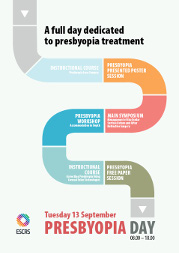Effects of myopic correction by laser in situ keratomileusis, PRK and phakic intraocular lens implantation (V4C ICL) on modulation transfer function and retinal magnification
Session Details
Session Title: Photoablation
Session Date/Time: Tuesday 13/09/2016 | 14:00-16:00
Paper Time: 14:48
Venue: Hall C2
First Author: : S.Goel INDIA
Co Author(s): : S. Mukherjee
Abstract Details
Purpose:
To compare the modulation transfer function and the retinal magnification after myopic correction laser in situ keratomileusis (LASIK), PRK or phakic intraocular lens (V4C ICL) implantation
Setting:
Anand Hospital & Eye Centre, Jaipur, India
Methods:
Using the ray tracing method, we measured the modulation transfer function and the retinal magnification in 40 eyes each with myopia , after various myopic corrections by LASIK, PRK and V4C ICL implantation.
Results:
The modulation transfer function (3-mm pupil) after V4C ICL implantation for the correction of low, moderate and high myopia was 45%, 44%, and 44%, respectively. These same measurements after LASIK were 50%, 47%, and 46%, respectively, and the same measurements after PRK were 48%, 44%, and 33%, respectively. The retinal magnification was least changed by the amount of myopic correction after phakic IOL implantation, more changed by LASIK, and most changed by PRK.
Conclusions:
There were no significant differences in the modulation transfer function after V4C ICL implantation and LASIK . On the other hand, the modulation transfer function was significantly decreased after PRK in high myopes. The retinal magnification was least affected by phakic IOL implantation, more affected by LASIK,most by PRK. Phakic IOL implantation and LASIK are considered to be optically excellent correction methods.
Financial Disclosure:
NONE





